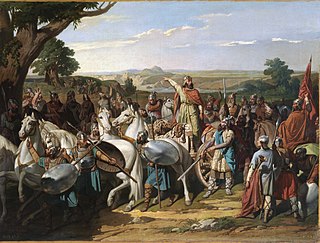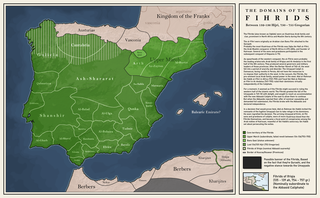
Abd al-Rahman I ibnMu’awiya was the founder of the Umayyad dynasty that ruled the greater part of Iberia in Al-Andalus for nearly three centuries. Abd al-Rahman was a member of the Umayyad dynasty in Damascus, and his establishment of a government in Iberia represented a break with the Abbasids, who had overthrown the Umayyads in Damascus in 750.

Year 716 (DCCXVI) was a leap year starting on Wednesday of the Julian calendar, the 716th year of the Common Era (CE) and Anno Domini (AD) designations, the 716th year of the 1st millennium, the 16th year of the 8th century, and the 7th year of the 710s decade. The denomination 716 for this year has been used since the early medieval period, when the Anno Domini calendar era became the prevalent method in Europe for naming years.
Marwan, Merwan or Marwen or Mervan is an Arabic male given name derived from the word marū/ maruw (مرو) with the meaning of either minerals, "flint(-stone)", "quartz" or "a hard stone of nearly pure silica". However, the Arabic name for quartz is ṣawwān (صَوَّان).

The Muslim conquest of Spain was an invasion of the Iberian Peninsula by the Umayyad Caliphate that occurred from approximately 710 to 780. The conquest resulted in the defeat of the Visigothic Kingdom and the establishment of the Umayyad Wilayah of Al-Andalus.
Abd al-Aziz ibn Musa ibn Nusayr was an Arab general and the first governor of Al-Andalus, in modern-day Spain and Portugal. He was the son of Musa ibn Nusayr, the Umayyad governor of Ifriqiya. ‘Abd al-Aziz had a long history of political and military involvement along with his father.

The Emirate of Córdoba or Umayyad Emirate of Córdoba was a medieval Islamic kingdom in the Iberian Peninsula.
Yusuf ibn Abd al-Rahman al-Fihri was an Umayyad governor of Narbonne in Septimania and the governor of al-Andalus from 747 to 756, ruling independently following the collapse of the Umayyad Caliphate in 750. He was a descendant of Uqba ibn Nafi, the founder of Kairouan.
ʿAbd al-Raḥmān ibn Ḥabīb al-Fihrī was an Arab noble of the Fihrid family, and ruler of Ifriqiya from 745 through 755 AD.
Anbasa ibn Suḥaym al-Kalbi was the Muslim wali (governor) of al-Andalus, from 721 to 726. Anbasa belonged to the tribe of Banu Kalb, which was established in southern Syria and northern Arabia since pre-Islamic times.
Al-Ḥurr ibn ʿAbd al-Raḥmān al-Thaqafi was an early Umayyad governor who ruled the Muslim province of Al-Andalus from between 716 and 718. He was the third successor to Musa bin Nusair, the North African governor who had directed the conquest of Visigothic Hispania several years earlier in 711. Al-Hurr was the first Muslim commander to cross the Pyrenees in 717, leading a small raiding party into Septimania. His incursions were largely unsuccessful, for which he was deposed in 718.
Ayyub ibn Habib al-Lakhmi was the second Umayyad Governor of Al-Andalus who succeeded his cousin Abd al-Aziz ibn Musa. He ruled for only 6 months, after which he moved to Cordoba and made it the capital of Muslim Iberia in place of Toledo.
Abd al-Rahman ibn Kathīr al-Lakhmī was the penultimate Umayyad governor of Al Andalus from October 746 until January 747. He was succeeded by Yusuf ibn 'Abd al-Rahman al-Fihri.
Tuwaba ibn Salama al-Judhami was Umayyad governor of al-Andalus from August 745 until October 746. He was succeeded by Abd al-Rahman ibn Kathir al-Lakhmi.

The Fihrids, also known as Banu Fihr, were an Arab family and clan, prominent in North Africa and Al-Andalus in the 8th century.
Ubayd Allah ibn al-Habhab al-Saluli was an important Umayyad official in Egypt from 724 to 734, and subsequently Umayyad governor of Kairouan, Ifriqiya from 734 to 741. It was under his rule that the Great Berber Revolt broke out in the Maghreb and al-Andalus.
Balj ibn Bishr al-Qushayri was an Umayyad military commander in the Maghreb and al-Andalus (Iberia), and briefly became the ruler of al-Andalus in 742 until his death in August of the same year. Balj was a member of the Banu Qushayr, a branch of the Nejdi Hawazin tribe, and was the nephew of Kulthum ibn Iyad al-Qasi, who had been appointed governor of Ifriqiya by the Umayyad caliph Hisham. In 741 Balj was cavalry lieutenant under his uncle's command on a military campaign against a Berber Revolt in North Africa. Kulthum headed an army of 30,000 Arab troops from regiments (junds) from Damascus, Jordan, Qinnasrin, Homs, Palestine and Egypt.

The Umayyad dynasty or Umayyads was an Arab clan within the Quraysh tribe who were the ruling family of the Caliphate between 661 and 750 and later of al-Andalus between 756 and 1031. In the pre-Islamic period, they were a prominent clan of the Meccan tribe of Quraysh, descended from Umayya ibn Abd Shams. Despite staunch opposition to the Islamic prophet Muhammad, the Umayyads embraced Islam before the latter's death in 632. Uthman, an early companion of Muhammad from the Umayyad clan, was the third Rashidun caliph, ruling in 644–656, while other members held various governorships. One of these governors, Mu'awiya I of Syria, opposed Caliph Ali in the First Muslim Civil War (656–661) and afterward founded the Umayyad Caliphate with its capital in Damascus. This marked the beginning of the Umayyad dynasty, the first hereditary dynasty in the history of Islam, and the only one to rule over the entire Islamic world of its time.
Al-ʿAlāʾ ibn Mughīth, called variously al-Yaḥṣubī, al-Ḥaḍramī or al-Judhāmī, was the ʿAbbāsid-appointed governor of al-Andalus (Spain) in opposition to the Umayyads in AD 763.
Abd al-Malik ibn Umar ibn Marwan ibn al-Hakam, also known as al-Marwani, was an Umayyad prince, general and governor of Seville under the first Umayyad emir of al-Andalus, Abd al-Rahman I. He led two major campaigns in 758 and 774, the first against the previous ruler of al-Andalus Yusuf ibn Abd al-Rahman al-Fihri and the second against the rebellious troops of Seville and Beja. His victories solidified the Umayyad emirate's control of western al-Andalus. His descendants continued to play important political and military roles in the Emirate well into the 10th century.





